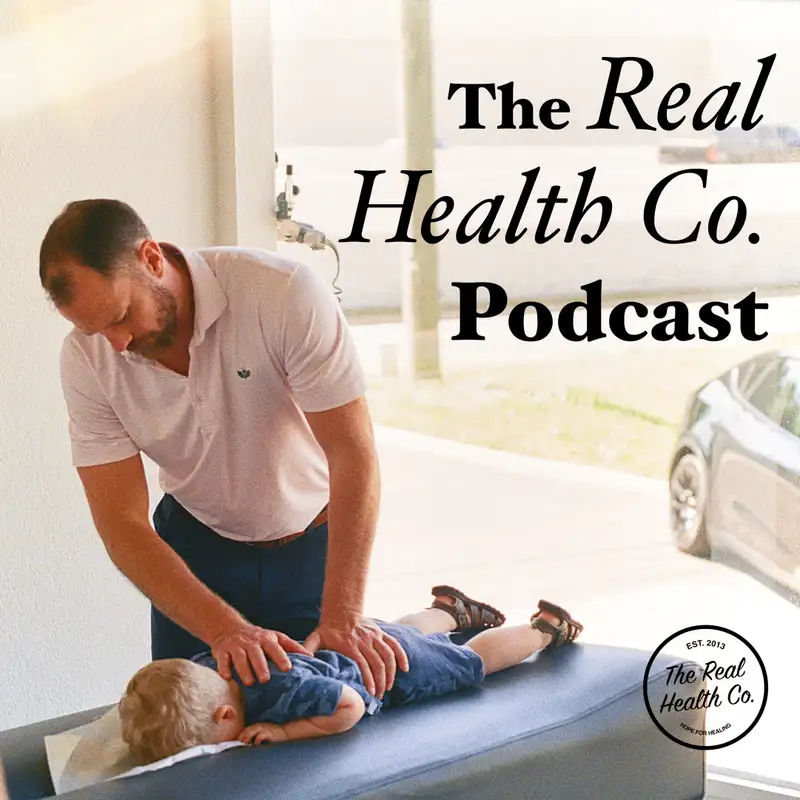 Episode 138
Episode 138
· 12:52
Welcome back to another episode of the Real Health Podcast. Last week we talked about labs that actually are significant in your health journey. Which labs should you look at to move your health needle? This week, the focus is if you could only take five supplements that actually move the needle, ones proven in clinical studies to improve blood pressure, lower cholesterol, reduce mortality, reduce cancer risks, improve performance, which would they be? So I narrowed things down to five supplements that you need to consider if you are trying to move the needle in your health journey.
Dr. Barrett:So we're gonna break down those five supplements. They're not hype, right? They're not some fancy Amazonian wild tree or branch or leaf that you're just looking at Instagram and thinking, "Oh yeah, I should take that. It's going help me. Someone took it and they don't have cancer anymore."
Dr. Barrett:Let's look at clinical indications behind not what's hyped, but what's really proven through the years to be the most effective strategy and where you just spend your money wisely. Right? Like, I a lot of people taking fifteen, twenty supplements a day. And they just ask the question, are these even doing anything? Right?
Dr. Barrett:So we're gonna talk about omega three fatty acids, soluble fiber, magnesium, creatine, and four fat soluble vitamins, a, d, e, k. That's what that's the big five. Let's dive in them. Without further ado, let's get to omega three fatty acids. So when it comes to omega-3s or EPA, DHA, EPA is for the body, DHA is for the brain.
Dr. Barrett:They each have a role, and so one of the most important roles that they have is that it's a heart protective powerhouse. The omega-three fatty acid, particularly EPA, has shown itself to be so effective at reducing cardiovascular risk. The REDUCE IT, literally it's called the REDUCE IT trial, showed a 25% reduction in major cardiovascular events with purified EPA, one of the fats within omega-three fatty acids. A meta analysis also showed and confirmed consistent triglyceride lowering, around 25 to 35% lowering triglyceride levels, and improved omega-three index obviously is associated with lower cardiovascular mortality. So when you look at EPA's effectiveness in reduction in in major cardiovascular events, reduction in triglycerides, it's it's an it's a no brainer.
Dr. Barrett:Right? Dosing is really dependent upon labs, so it's something to look at, your omega-three index. But in generality, like a general recommendation for most of my patients is gonna be anywhere between one thousand to two thousand milligrams a day of true triglyceride based omega three fatty acids. Not some cheap form that's full of mercury. Right?
Dr. Barrett:It's coming from fish, so it can it can have a lot of contaminants in it, but triglyceride bound omega-three fatty acids. A couple grams a day is usually all someone needs. You may need more. You may need less. That's why you test.
Dr. Barrett:Work with your provider to make sure you get the right dosing. DHA for the brain is very effective at any type of neurodevelopment disorder, Alzheimer's, dementia, neurological based issue or symptom, you should probably focus more on DHA versus EPA, but obviously both are very effective at reducing inflammation, helping the body heal, recover, repair, and have greater performance. So number one, omega-three fatty acids. Number two, soluble fiber. Like, really?
Dr. Barrett:Doctor. Paired fiber? Yes. Fiber is fantastic for LDL control and glucose control. There's clinical data that shows how important fiber is, and you can take this obviously from your nutritional source food, or you can supplement with it like psyllium husk.
Dr. Barrett:But soluble fiber, literally, what it does, it binds bile, alright, the bile acids to reduce LDL and and stabilize blood sugar levels. There's a meta analysis done and showed that ten grams a day of psyllium lowered LDL by seven to ten percent. That is significant. Diabetics showed a point five to point 8% reduction in a one c levels and improved, obviously, like their post meal glucose control. When you consume that fiber, it helps stabilize blood sugar levels.
Dr. Barrett:If you're dealing with blood sugar dysregulation, should you should absolutely consider consuming a greater amount of fiber every day. And if you're not getting it from your diet, you definitely need to consider supplementing with it, and psyllium husk is a great way to do it. So how much? Seven to twelve grams per day is a great dose of fiber. You're going take that husk with water and away from any type of meds or supplementation.
Dr. Barrett:Psyllium is one of the simplest ways to lower LDL cholesterol naturally and it doubles as a prebiotic for your gut health. Number three, magnesium. Magnesium is crucial for over 300 enzyme reactions in your cells, and it affects vascular tone and glucose metabolism. So when we look at the magnesium, there's a lot of different forms. I I typically go into magnesium glycinate as a good general rule of thumb.
Dr. Barrett:There are other forms that can affect different systems of the body, but meta analysis showed that three hundred sixty eight milligrams per day, so so about four hundred milligrams a day, of magnesium reduced systolic blood pressure by four points. That's that's significant. Magnesium's effects on on blood pressure. Why? Because it affects vascular tone or the tone of your blood vessel walls, making it more relaxed, lowering blood pressure.
Dr. Barrett:Higher magnesium intake is correlating with lower risk of type two diabetes and sudden cardiac death. There's benefits to where magnesium actually keeps the blood thin and has obviously vascular integrity. Magnesium is also helpful for calming the nervous system, improved sleep quality, and obviously how important it is to make sure that your cells are creating ATP or energy. The dose is typically two hundred-four hundred mg. Anything over that can cause bowel issues, but typically two to four hundred milligrams of magnesium glycinate at night is my typical recommendation.
Dr. Barrett:Mineral magnesium is the mineral most people are missing, and it's and it's quietly linked to heart disease and and and and brain function. Consider magnesium. Number four, you've heard me talk about this before, but number four is creatine monohydrate. In particular, sure it's from the form of CreaPure, which is a purified form of creatine monohydrate, but but you don't have to get fancy here. Clean CreaPure creatine monohydrate at at five grams a day is is massive, and and it's also beyond athletes.
Dr. Barrett:It's not an athletic performance supplement alone. Creatine helps preserve lean mass. So if you're struggling with, as you age, the ability to retain or build lean mass, it's it's great for that. It supports brain energy. So there are studies showing creatine and its effects on headaches and migraines.
Dr. Barrett:So if you're dealing with headaches and migraines, creatine monohydrate should absolutely be considered. If you want greater cognition, focus, energy, then creatine should be something to look at every day. I supplement with it first thing in morning when I wake up. Five grams, scoop of water, knock it down first thing I consume every single day. It's so inexpensive.
Dr. Barrett:Literally for pennies you're improving ATP production. There was a meta analysis done where creatine and resistance training increased strength by eight to 14% versus a placebo. Creatine has that effect. If you're trying to gain lean mass in the season, absolutely need to be consuming creatine. And then even cognitive trials that showed improved working memory and reduced mental fatigue and sleep deprivation.
Dr. Barrett:So when these patients were sleep deprived, they added creatine and noticed a significant improvement in working memory and reduced mental fatigue. So about five grams a day. You don't need a low dose, like right back in the day you just take twenty grams the first day. Don't need to do that, just five grams simply every day in the morning when you wake up in water. Creatine isn't just for gym rats, it's for protecting your brain and your muscle as you age.
Dr. Barrett:The last one and one of the most critical ones that need to be tested and supplemented is vitamin ADEK. ADEK, these are your four fat soluble vitamins. And they are crucial to long term health. When we look at these vitamins they regulate gene expression, calcium metabolism, antioxidant protection, immune health, cardiovascular balance and the list goes on. When you look at Vitamin D, there was a study that showed a reduced risk of all cause and cancer mortality in patients that were deficient.
Dr. Barrett:Vitamin K reduces arterial stiffness and calcification. It's why you shouldn't be taking calcium to build bone density. You need to be taking vitamin D, vitamin K, and calcium to actually build bone density. That vitamin K gets that calcium out of the blood vessels and it's causing calcification. Vitamin E and A, these are powerful antioxidants and immune modulators.
Dr. Barrett:These are critical for immune function, hormone production, antioxidant protection, and it's even obviously linked to vitamin A particularly to vision. We supplement vitamin A in our home when there's illness as it helps with viral loads. When look at dosing, it's so important. I'm not even going give recommended dosing because these are fat soluble vitamins that can overly accumulate if you're just randomly dosing. You've got to make sure that you test and supplement accordingly.
Dr. Barrett:When you look at these fat soluble vitamins, they're usually in a combined formulation of ADEK and one of my favorites is from a company called Apex Energetics that we use here in office. These four fat soluble vitamins, they they're a team. They work as a team. And and as we look at their effects on the body, it it absolutely needs to be in your supplement cabinet. When looking at omega-three fatty acids, fiber, creatine, magnesium, and these four fat soluble vitamins, we're talking about true supplements that move the needle in your health journey.
Dr. Barrett:Test, supplement properly with right dosing and it can make a massive difference. If you're not considering these supplements today, go ahead dive in with your practitioner and make sure you're working towards adding these into your health journey. They can make that significant of a difference. As always, you've enjoyed the information, we're giving it to you at no cost. Share this podcast, like it, subscribe to our YouTube channel or to our Instagram so that you can kind of stay up to date with everything that we're doing.
Dr. Barrett:Hey, thanks for listening to another episode of the Real Health Podcast. Our passion is to add value to your healthcare journey. Anything that we do, we want to do it within a community to help as many people as possible. Thanks for listening to episodes of Real Health Podcast. If you could like, if you could subscribe and you can share, it would help our mission to reach as many people with real health that produces real results for real people.

Listen to The Real Health Co. Podcast using one of many popular podcasting apps or directories.